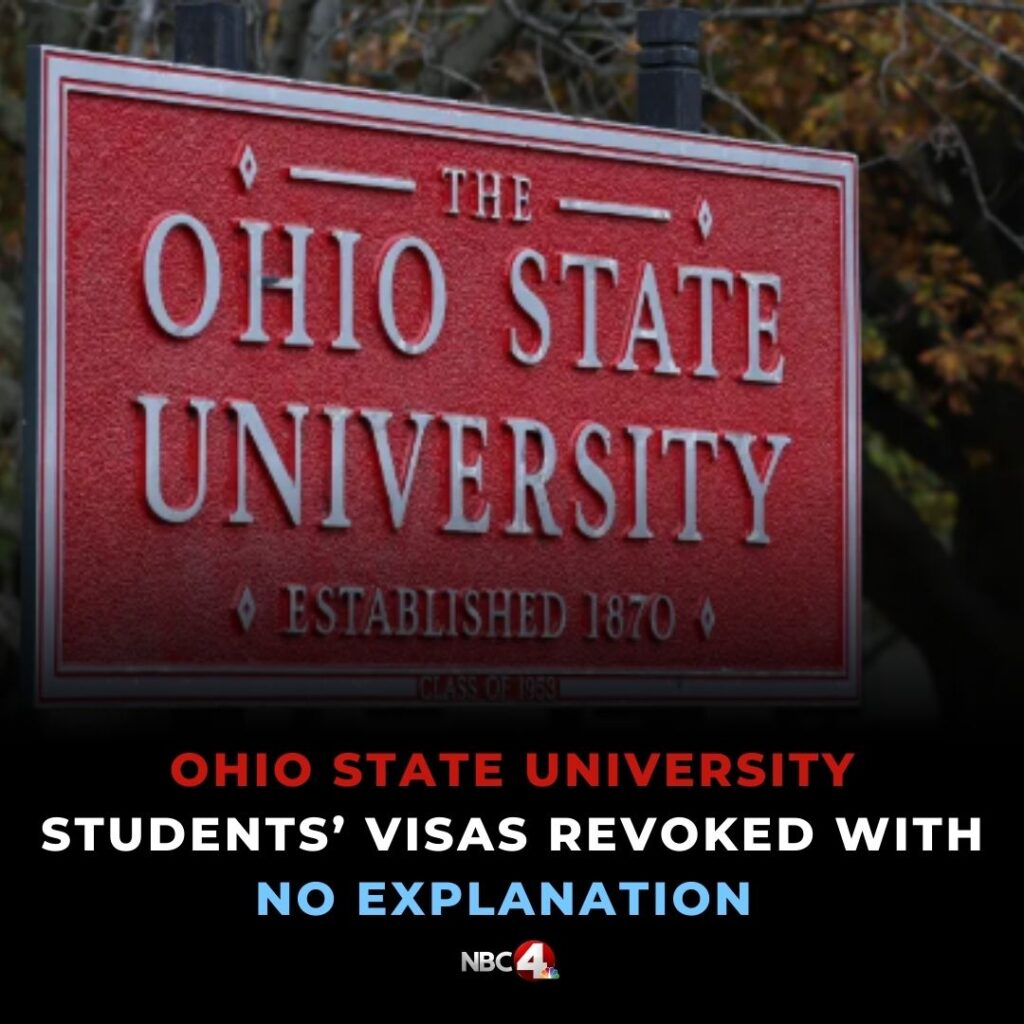
Five Ohio State University students had their international visas revoked without providing an explanation.
The revocation of international student visas has emerged as a matter of increasing concern for both students and educational institutions across the United States. A recent incident at Ohio State University (OSU), where five students had their international visas revoked without explanation, has raised alarm among students, faculty, and policymakers. This case exemplifies a growing trend that has left many international students in a state of uncertainty about their academic futures and legal standing in the country. In this article, we will explore the incident, its potential implications, and what this means for both Ohio State University and international students at large.
According to recent reports, five international students enrolled at Ohio State University had their visas unexpectedly revoked. The students, who hailed from various countries and were pursuing degrees in diverse fields, received no formal explanation from the U.S. government regarding the revocation. This action has left the students in a legal limbo, unable to continue their studies in the United States, and unsure of their next steps.
It was revealed that the affected students were informed of the visa cancellations through a notice from the U.S. Department of Homeland Security (DHS), but the reasons for the decision were not disclosed. Some of the students were reportedly studying for their undergraduate degrees, while others were in the midst of graduate programs. They had followed all the legal protocols for securing their student visas and had maintained their status as required by U.S. immigration laws. Despite this, the revocations have thrown their academic and personal lives into turmoil.
One of the most unsettling aspects of this case is the lack of communication from the authorities. The U.S. government, specifically the DHS and the U.S. Citizenship and Immigration Services (USCIS), has remained tight-lipped about the specific reasons for the visa revocations. In a statement, a DHS spokesperson merely indicated that they “cannot discuss individual cases.” While this is standard practice for the agency, the silence has left both the affected students and the broader university community in the dark.
This lack of transparency has been criticized for several reasons. For international students, the uncertainty surrounding their legal status in the U.S. creates anxiety, which can hinder their academic performance and mental health. The absence of clear communication also makes it difficult for institutions like OSU to provide proper support and advocacy for their students. Without a valid explanation, there is no way to know if this is an isolated incident or part of a larger trend.
Ohio State University is a renowned academic institution with a diverse student body, including a large number of international students. The revocation of these students’ visas has far-reaching consequences for the university itself. First and foremost, the immediate impact is felt by the affected students who can no longer legally attend classes or participate in university-sponsored activities.
In addition to the personal hardship this creates for students, the university is also facing questions from other international students about their own legal standing. OSU’s international office and various support services are under pressure to reassure the broader international community that the university is committed to supporting its students and ensuring their legal status is secure.
Moreover, this incident may impact Ohio State’s global reputation. Universities across the U.S. rely on international students not only for their contributions to the academic environment but also for their economic impact. International students contribute billions of dollars to the U.S. economy each year, through tuition fees, housing, and daily living expenses. A perception of instability and unpredictability in visa policies could deter future international students from choosing Ohio State or other U.S. universities.
The Ohio State case is not isolated; it is part of a larger pattern of uncertainty facing international students in the U.S. Over the past several years, there have been increasing concerns about visa denials, revocations, and changes to policies that affect the international student population. This has been especially evident under the administration of former President Donald Trump, with a significant shift in how U.S. immigration policies were structured.
For international students, the United States has long been considered a destination for higher education, with many universities offering world-class programs that attract students from all over the world. However, tightening visa regulations, as well as more stringent enforcement of immigration laws, have made it more difficult for students to navigate the complex system.
Visa revocations like the one that occurred at Ohio State University can lead to widespread panic among international students. Many students are on tight timelines and have invested significant resources in their education. A sudden revocation can mean the loss of an academic semester, potentially delaying graduation and putting career opportunities at risk.
The uncertainty also creates an environment where international students may feel pressured to conceal information about their academic status, fearing that a minor mistake could jeopardize their future. This type of anxiety is detrimental not only to the students themselves but to the entire educational ecosystem.
In light of the lack of transparency, the affected students at Ohio State may have legal grounds to challenge the visa revocations. There are established legal processes in place for international students to contest visa denials or revocations. In some cases, students have successfully appealed decisions by providing additional documentation or presenting new evidence that supports their case.
One such example occurred several years ago when a group of international students filed a lawsuit after their visas were revoked under similar circumstances. The case led to a ruling in favor of the students, as the court found that the U.S. government failed to provide sufficient reasoning for the revocation of their visas. This precedent could potentially pave the way for the Ohio State students to challenge their visa revocations.
However, legal challenges can be costly and time-consuming. Many international students, particularly those from lower-income backgrounds, may not have the resources necessary to pursue legal action. This underscores the importance of institutional support from universities like Ohio State in navigating the legal and bureaucratic complexities of visa issues.
In response to such incidents, universities must take proactive steps to support their international student populations. OSU has expressed its commitment to helping the affected students by providing resources and guidance on how they might be able to resolve the issue. The university’s international student office is likely working closely with legal experts to help the students understand their options and the next steps they can take.
Moreover, institutions must ensure that international students have access to information about their rights and the visa application process. Clear communication, transparency, and support systems are crucial for maintaining the trust and well-being of the international student community.
Universities should also engage in advocacy at the national level to ensure that U.S. immigration policies are fair, transparent, and consistent. Universities are integral to the global knowledge economy, and ensuring that they remain accessible to students from all over the world is essential to the country’s continued leadership in higher education.
The revocation of five international students’ visas at Ohio State University without explanation has sparked a broader conversation about the challenges faced by international students in the United States. While the immediate impact is devastating for the affected individuals, it also raises important questions about the transparency, fairness, and stability of U.S. immigration policies.
The uncertainty surrounding this case underscores the need for more robust protections and support systems for international students. Higher education institutions, along with policymakers, must prioritize the well-being of international students to ensure that the U.S. remains a welcoming destination for scholars from around the globe. Without greater clarity and reform, incidents like this will only continue to erode the trust and confidence of international students, which could have long-term consequences for U.S. higher education.





